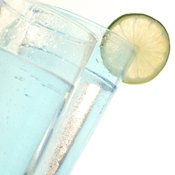It was still daylight on a nice afternoon last April. I was busy, hungry and tired when my emotions got the better of me, and I drove into a fast food restaurant to eat before going home. The sandwich tasted a little odd, but I decided it was my imagination—probably just the spices. That was the beginning of my learning experience about the importance of drinking water.
Everything was going well until about 10 p.m. that night when I began to feel ill. For the next two or three hours, the pain and nausea were relentless. After several hours, it was time to go to the emergency room.
The emergency room was the beginning of a nightmare—one that would make water the focal point of my life. The trauma team informed me that I needed immediate surgery to remove my gallbladder. They showed me a scan the staff had taken: My gallbladder looked like a large boiling pot filled with hundreds of Mexican jumping beans.
I'd had gallbladder issues before, but apparently I'd been drinking enough water to wash the toxic gallstones out of my body. But now my condition had gotten so bad, it was time to operate. Doctors informed me that because of the length of time I had been producing them, my body might continue to produce stones, even though they had removed my gallbladder. The secret to living with this condition, my doctor reiterated a number of times, was to drink a lot of water.
I have always known that water was good for things like losing weight and having a good complexion, but now it was a matter of my quality of life—maybe even life or death. I needed water to wash the toxins out of my body as well as any stones.
"How much water should I drink?" I asked my doctor, Dr. Lonnie Frei, after the surgery. My research indicated that the amount depended on a number of factors, including my weight and height, and how much I exercised.
"As much water as possible," Frei said. "At least eight glasses a day or more."
After drinking my quota of water, I could have a moderate amount of other types of drinks, but they need to be low calorie. At this writing, I'm drinking 10 to 14 eight-ounce glasses or bottles of water a day and a moderate amount of coffee and tea. I don't drink fruit juice because my diet says to eat fruit. I get more fiber by eating whole fruit.
The Mayo Clinic says you should modify your total fluid intake depending on how active you are, the climate you live in, your health status and whether you're pregnant or breast-feeding. You need to replace fluids you lose through sweating, for example, whether because of exercise or simply living through a hot and humid Mississippi summer. You'll also require additional water during any illnesses accompanied by fever, vomiting or diarrhea to prevent dehydration.
Being thirsty is generally not the best indicator of how often or how much water you need. As a matter of fact, by the time you're thirsty, you may already be slightly dehydrated. Also, as you age, your body gradually loses the ability to feel thirsty.
If you see your doctor this summer, ask how much water you need and whether that includes all liquids or only water. In the Mississippi heat, it may be the most important question you ask.
More Flavorful Water
Consult your doctor about including drinks other than plain water for your required daily liquid intake. Some medical websites suggest avoiding caffeine. Below are some you alternatives to supplement water or replace it, according to your doctor's advice.
• Popsicles, either purchased at the store or homemade from juice or Kool-Aid, are a terrific way to get fluids.
• Make apple juice refresher by mixing together 1/3 cup apple juice with 2/3 cup of sparkling mineral water and serve at room temperature.
• For watermelon slush, put one or two cups of seedless watermelon with a little lemon juice in a blender. Blend with ice cubes until it makes slush.
• Cucumber and orange flavoring adds freshness to plain water. For every cup of cold water in a pitcher, add one cucumber slice and one orange slice. Cover and chill in the refrigerator for at least 30 minutes. Makes a great thirst quencher for a hot summer day.
Signs of Dehydration
Mild to moderate dehydration is likely to cause:
• Dry, sticky mouth
• Sleepiness or tiredness—children are likely to be less active than usual
• Thirst
• Decreased urine output—fewer than six wet diapers a day for infants and eight hours or more without urination for older children and teens
• Few or no tears when crying
• Muscle weakness
• Headache
• Dizziness or light-headedness
Severe dehydration, a medical emergency, can cause:
• Extreme thirst
• Extreme fussiness or sleepiness in infants and children; irritability and confusion in adults
• Very dry mouth, skin and mucous membranes
• Lack of sweating
• Little or no urination—any urine that is produced will be dark yellow or amber
• Sunken eyes
• Shriveled and dry skin that lacks elasticity and doesn't "bounce back" when pinched into a fold
• Low blood pressure
• Rapid heartbeat
• Fever
• In the most serious cases, delirium or unconsciousness
According to the Mayo Clinic website, thirst isn't always a reliable gauge of the body's need for water, especially in children and older adults. A better barometer is the color of your urine. Clear or light-colored urine means you're well hydrated, whereas a dark yellow or amber color usually signals dehydration.
If you're a healthy adult, you can usually treat mild to moderate dehydration by drinking more fluids. Get immediate medical care if you develop severe signs and symptoms such as extreme thirst, no urination for eight hours, shriveled skin, dizziness and confusion. For more information about dehydration in adults, children and older adults, visit http://www.mayoclinic.com.


